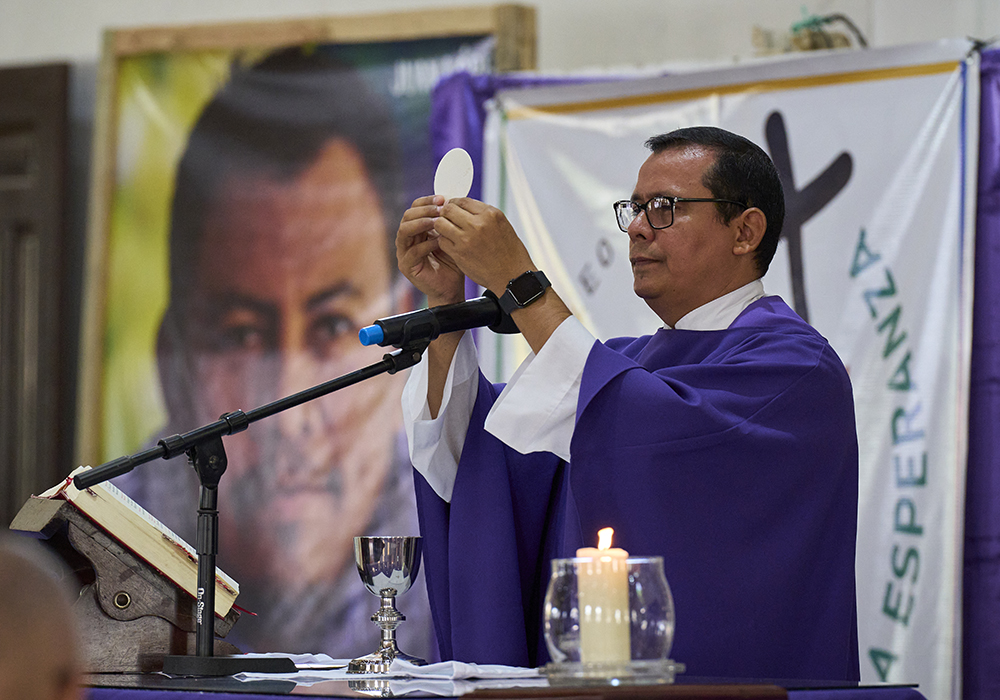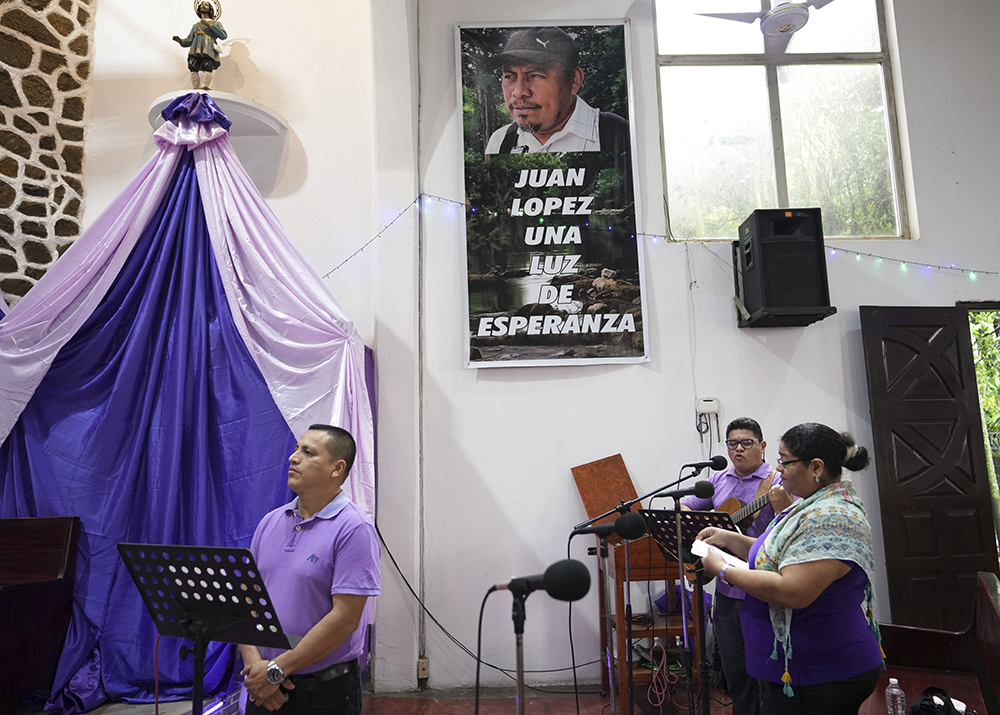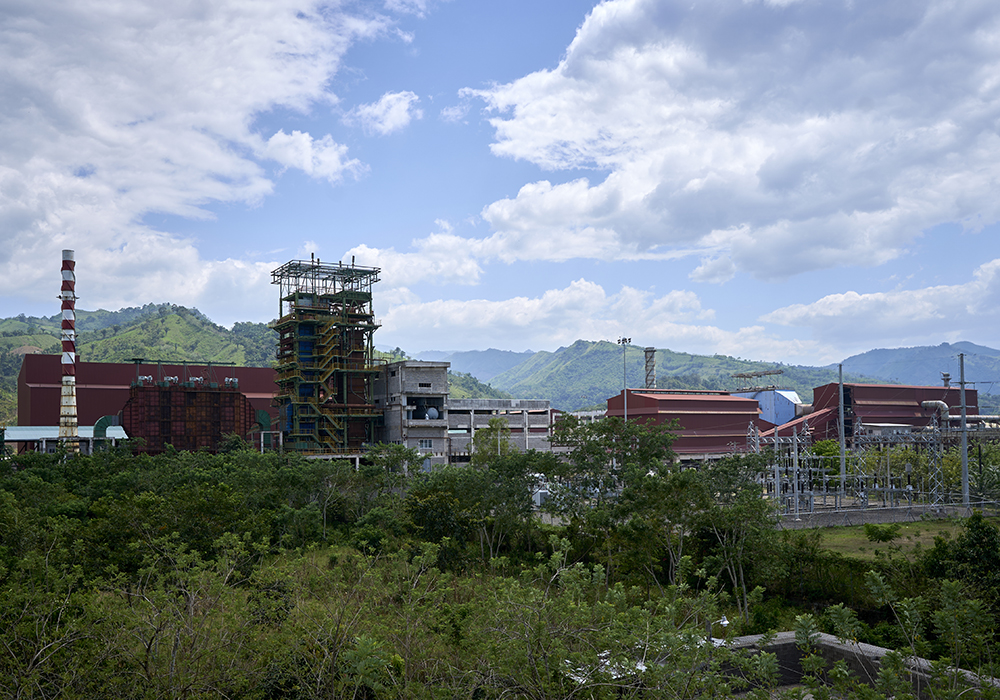
In front of a small Catholic church in the Fabio Ochoa neighborhood of Tocoa, Honduras, a cross marks the spot where Juan López, a Catholic delegate of the word, was assassinated on Sept. 14, 2024. López had just finished leading a celebration of the word in the church. (NCR photo/Paul Jeffrey)
Alongside the dirt street in front of a small Catholic chapel, a simple cross marks the place where Juan López died last September after a gunman fired six bullets into his chest and one into his head.
López's blood has since soaked into the dust and the bullet holes on the front of the church have been plastered over.
But why he was killed still remains in question.
López, a Catholic delegate of the word and a leading voice fighting environmental destruction and corruption on the northern coast of Honduras, was shot after leading a parish service in the poor Fabio Ochoa neighborhood where he lived.
Within hours of the Sept. 14 killing, the priest who heads the town's San Isidro Labrador parish, Jesuit Fr. Carlos Orellana, alleged that the town's mayor, Adán Fúnez, was responsible for the murder. Just days before he was killed, López, a member of the city council, had accused Fúnez of corruption and demanded that he resign.
In October, police arrested three men and charged them with being the "material authors" of the assassination. After several delays, a preliminary hearing for the three men was held on June 3 where the judge delayed proceedings until Aug. 14.

Jesuit Fr. Carlos Orellana preaches during Mass in the San Isidro Labrador Catholic Church in Tocoa, Honduras, on March 23, 2025. Behind him is a portrait of Juan López, a Catholic delegate of the word who was assassinated in Tocoa on Sept. 14, 2024. (NCR photo/Paul Jeffrey)
"It's been nine months since the murder of Juan López, and after the initial uproar, the prosecutor has abandoned the family and the communities that demand justice," Jesuit Fr. Ismael Moreno told Radio Progreso after the hearing, claiming the government's response was characterized by "slowness, negligence and charlatanism."
In the days after the murder, government investigators seized security video from Fúnez's residence. Journalists reported in February that the video shows the mayor talking with one of the gunmen. Prosecutors have refused to comment other than to say they're awaiting a forensic analysis of cellphones taken from the three arrested men.
On June 3, Amnesty International encouraged Honduran authorities to ensure that "both the material and intellectual authors of the crime are brought to justice."
The Honduras office of the United Nations High Commissioner for Human Rights has also called on the government to continue investigating both the killing and "the causes for which [López] struggled until the end, especially the environmental damages and illegal exploitation of natural resources."
Sophia Vazquez carries palm oil berries on the La Lempira Cooperative, near Ceibita, Honduras. The plantation sits in the middle of the Aguan Valley, the scene of a violent and protracted struggle over land in the north of Honduras. (NCR photo/Paul Jeffrey)
The town of Tocoa, where López was killed, sits in the middle of the Aguan Valley, which has long been plagued by the collusion of drug traffickers, wealthy landowners and corrupt politicians. In 1997, gunmen killed Carlos Escaleras, a Catholic delegate of the word who opposed plans to install a palm oil processing plant near the Guapinol River.
When Jesuit Fr. Peter Marchetti, a U.S. priest serving the Tocoa parish, claimed Escaleras' killing was ordered by the country's wealthiest landowners, hitmen were allegedly hired to kill him, and the Jesuits whisked him out of the country in 2001.
"The Society sent me to Spain to walk the Camino de Santiago [pilgrimage route.] It was a good place to hide," Marchetti said.
The priest says the same problems affect the Aguan Valley 24 years later, saying: "Juan López was killed precisely because things haven't changed."

A poster of slain environmentalist Juan López hangs on a wall at the San Isidro Labrador church during a Mass in Tocoa, Honduras, on Dec. 8, 2024. (AP photo/Moises Castillo)
If anything, the situation is worse. Although a national park was named after Escaleras, the government allowed loggers and miners unfettered access. An iron oxide mine opened and the government jailed opponents, including López, who was released after 12 days.
Under pressure, Honduran President Xiomara Castro temporarily suspended the mine's permit in 2023.
Along the Guapinol River, where a giant plant has been built to process ore from the mine, a peasant leader says López was a spiritual guide.
"Juan was very educated and committed to both defending the environment and the peasant communities. He helped orient us and guide us. He was close to us," said Raul Ramirez, a leader of the Nueva Lempira community.

The Los Pinares iron ore processing plant in northern Honduras looms over the peasant community of Nueva Lempira. Residents say the project, which is currently suspended by the government, will force them to choose between living with contamination or moving elsewhere. The community received support in their opposition from Juan López, who was assassinated Sept. 14, 2024, in Tocoa. (NCR photo/Paul Jeffrey)
"He pushed us to defend creation, which is suffering here. Because of the growing contamination of the river and the air, we will soon be facing a choice between being forced to leave or choosing to stay and die," Ramirez said.
López endured constant threats because of his activism, and one time left the region for several weeks.
Adilia Castro, a church activist who co-founded with López a local anti-corruption group, says López was determined not to leave again.
Advertisement
"He said he would never flee again, no matter the price he had to pay. He was clear that we were engaged in a struggle for life, and his mission was the mission of Jesus, who in the context of Latin America today he saw as Jesus of the resistance to those who have political and economic power and abuse the poor," Castro said.
According to Bishop Jenry Ruiz of the Diocese of Trujillo, "Juan incarnated Laudato Si' in his heart," referring to Pope Francis' 2015 encyclical. In the Aguan Valley, such fidelity to church teaching made López a target.
"Yet Juan had heard the Gospel, calling him to follow Jesus even to the ultimate consequences," said Ruiz, who named López to coordinate outreach ministries in the diocese.
Mikey del Cid, 9, plays in the Guapinol River in northern Honduras. The river and those who live alongside it are threatened by mining operations — currently suspended by the government — in the Carlos Escaleras National Park. Communities resisting the mining operations received support from Juan López, who was assassinated Sept. 14, 2024, in nearby Tocoa. (NCR photo/Paul Jeffrey)
Orellana, a native of El Salvador, says López's murder challenges him to greater discipleship.
"When they assassinated Juan, it was a wake-up call for me. It was in Juan's demands for justice, his calls to respect creation, that I began to really hear the voice of Monseñor [Oscar] Romero. I didn't know Romero personally, but he was a bishop who denounced injustice and the assaults on the poor," the priest said.
"After they killed Juan, I felt I had to do something," he said, believing that "the spirit of Juan and of Monseñor Romero" will give him strength.
Ruiz says the church will continue to demand justice for López and for other environmental defenders "who have been stigmatized, assaulted and persecuted as if they were criminals."
"We know it won't be quick, that it might take many years, but in the meantime the communities and the environmental defenders will continue struggling for justice, so that the blood that Juan shed will not be in vain. His blood is precious, because of the deep love that Juan had for the mountains and the people who live there."





